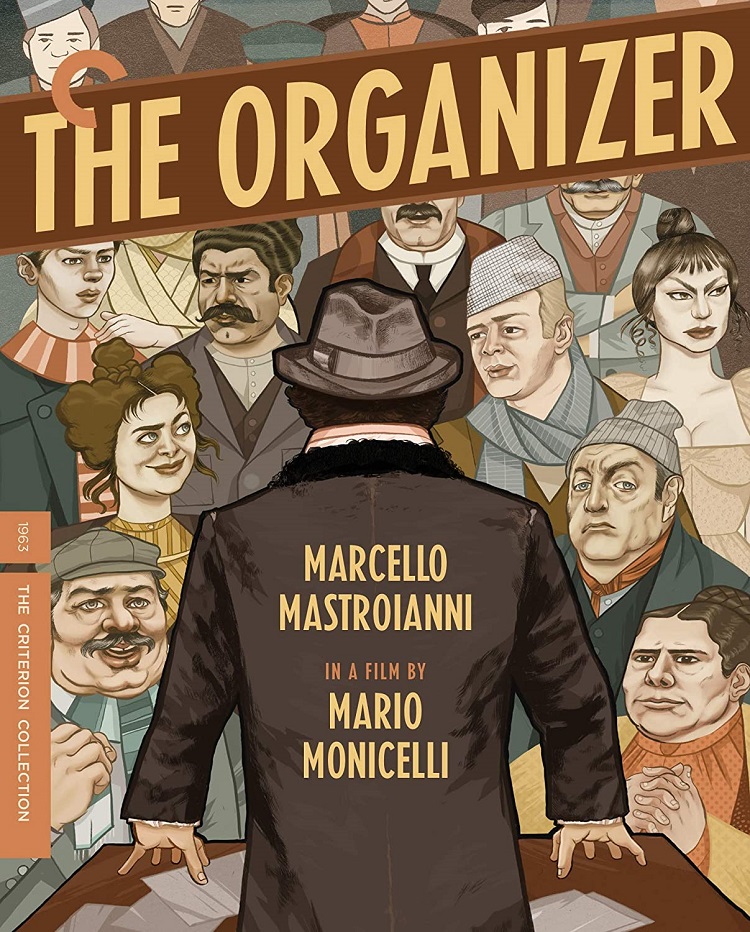
Written by Lisa McKay
The Organizer, a 1963 film from Italian director Mario Monicelli and one of this month’s new releases from the Criterion Collection, takes place in Turin, Italy at the turn of the 20th century. It tells the tale of a group of factory workers, in the days before the proliferation of Italian labor unions, who attempt to organize themselves so that they can negotiate better working conditions for themselves.
Life in the factory is miserable; the workers put in 14-hour days, punctuated only by 30 minutes at midday for lunch. One factory worker insists that his wife bring their baby by at lunchtime so that he can at least see the boy, who is asleep when he leaves in the pre-dawn hours and again when he returns home in the evenings. In the late afternoon, workers become drowsy at their stations, and it’s not long before the inevitable industrial accident occurs, sending one man to the hospital minus a hand. His co-workers gather at the hospital and take up a meager collection for his family, but it’s not long before they start airing their grievances about their working conditions.
A few of the workers decide that they need to demand some changes from management, and the remainder of the film details their efforts to organize a strike in order to force management to negotiate. They are aided in this cause by Professor Sinigaglia, the titular organizer (Marcello Mastroianni), who shows up on the scene as he is fleeing the authorities in Milan, where it turns out he is wanted for his role in orchestrating a demonstration. The remainder of the film chronicles the strike and its outcome, and I won’t spoil the ending but to say that the conclusion is a deftly balanced combination of pessimism and inspiration.
Mastroianni is wonderful in his role, portraying Professor Sinigaglia as a down-at-the-heels, genteel intellectual who is nonetheless adept at firing up the workers as only an experienced outside agitator can. While Mastroianni’s name will likely be the one most familiar to the majority of American viewers, the entire ensemble cast is wonderful, with particular notice going to Renato Salvatori, Fulco Lulli, and Annie Girardot.
Monicelli, who died in 2010 at the age of 95 after a prolific career in directing and screenwriting that spanned the years from 1935 to 2006, is perhaps best known to American film-goers for 1958’s Big Deal on Madonna Street. He is the leading proponent of the genre which came to be called commedia all’Italiana, which finds humor in the more tragic circumstances of daily life. The Organizer displays the filmmaker’s fondness, and respect, for the working classes, who are portrayed here not as a romantic ideal of noble struggle but as human beings with faults and good points who must learn to balance their idealism with the reality of their day-to-day struggles.
The cinematography is by Giuseppe Rotunno, who worked frequently with Federico Fellini. The scenes filmed in the factory (the actual factory interiors were filmed in Zagreb, Yugoslavia), where the steam-powered machinery provides a wonderful visual expression of the workers as simply one more piece of the means of production, are particularly striking.
The Organizer feels surprisingly relevant in today’s political climate as labor unions are facing challenges from all quarters and people are happy to have any job in a tough economy. While it’s often easy to see how labor unions in modern times have perhaps overreached, movies like this serve to remind us why they were at one time so very necessary. The story puts into sharp contrast the timeless conflict between the idealistic desire of workers to have a voice in how their workplaces are run (which of course runs counter to the interests of the owners) and the pragmatic and very real need to feed their families.
Bonus materials include an essay by film critic J. Hoberman, an introduction to the film by Monicelli himself, which was filmed by Criterion in 2006, and a theatrical trailer. Both the essay and Monicelli’s introduction are well worth the time and provide excellent background for the interested viewer, with Monicelli going into some detail about commedia all’Italiana and the historical and political background of the film.
The Organizer was filmed in black and white and is presented here in its original 1.85:1 aspect ratio. The digital transfer for this Blu-ray edition was prepared from a new 35mm print, and is free of any dust or scratches. The dimly lit interior scenes, primarily in the factory and inside people’s homes, are very dark but preserve detail well, while the outside scenes are bright without being washed out. The original monaural soundtrack has also been digitally remastered and has been cleaned of any noise. The dialog is very clear, with no hiss or other extraneous noise, although non-Italian speakers will be dependent upon the English subtitles. Like all offerings from Criterion, The Organizer is a worthwhile addition to any film lover’s collection.